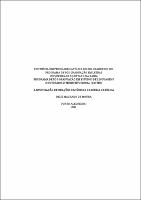| Share record |


|
Please use this identifier to cite or link to this item:
https://tede2.pucrs.br/tede2/handle/tede/2176| Document type: | Tese |
| Title: | A enunciação de orações canônicas da Igreja Católica |
| Author: | Moura, Deije Machado de  |
| Advisor: | Barbisan, Leci Borges |
| Abstract (native): | Desempenhando o papel de locutor orante, membro ou não da Igreja Católica, o indivíduo elabora seu próprio discurso (orações abertas) e/ou faz uso de textos já prontos e disponíveis para uso (orações canônicas). Nesse último caso, ele se identifica com o eu da oração, apropria-se do texto como se fosse elaboração sua, e ao enunciá-lo atribui ao discurso um sentido próprio, único. Sob esse olhar, levantamos inquietações acerca do fenômeno linguístico da enunciação, mais especificamente, a enunciação de orações canônicas da Igreja Católica, a fim de verificarmos o seguinte: como essa abordagem enunciativa pode ser delineada (elementos e conceitos); de que maneira percebemos a manifestação da alteridade nesse processo; o que entendemos como repetível ou irrepetível nesse tipo de enunciação; e o que diferencia esse tipo de enunciação de uma enunciação ordinária. Toda essa reflexão é alicerçada em princípios da teoria desenvolvida por Oswald Ducrot Teoria da Argumentação na Língua (ANL), no que diz respeito à questão, como também em fundamentos encontrados na base de seus estudos (Saussure e Benveniste) e estudos de discípulos seus, a exemplo da pesquisadora Carel. Escolhemos essa teoria como ponto de partida para nossa investigação pela sua objetividade, coerência, precisão no estudo de aspectos da linguagem, sem termos que recorrer a aspectos externos a essa. O corpus selecionado para nossas discussões é restrito a orações canônicas da Igreja Católica, como: Pai-Nosso, Ave-Maria, entre outras direcionadas a santos. Após pensarmos na ocorrência dessa forma de enunciação, comparando-a com as ideias dos estudiosos apresentados na fundamentação teórica deste trabalho, constatamos que: os conceitos dos elementos da enunciação de orações canônicas se distinguem em algum aspecto dos que são apresentados para uma enunciação ordinária; o locutor e a estrutura dos textos oracionais respondem pela alteridade que se manifesta nessa abordagem enunciativa; percebemos e explicamos o processo de repetibilidade e irrepetibilidade na enunciação desse tipo de texto; discorremos sobre as atitudes discursivas do locutor e a impossibilidade do processo de reversibilidade de papeis entre locutor e alocutário; e por fim apresentamos propostas para outras investigações sobre o tema aqui em estudo: a enunciação de textos prontos e postos na língua para uso. |
| Abstract (english): | Playing the role of a prayerful reader, whether a member of the Catholic Church or not, the individual elaborates his own speech (free prayers) and/or uses the texts that are already done and available for use (canonical prayers). In the later case, he identifies himself as the self in the prayer, and make use of the text as if it were his own, and while enunciates it, gives the speech his own unique meaning. From this view, issues concerning the linguistic phenomena of enunciation, more specifically, the enunciation of Catholic Church s canonic prayer are raise and we aim to access how these enunciative approaches may be designed (elements and concepts); in a way we can perceive the otherness manifestation in the process; which may be understood as repeatable or unrepeatable in this kind of enunciation, which differentiates this kind of enunciation from an ordinary one. All this reflection is based on the principles of the theory developed by Oswald Ducrot Teoria da Argumentação na Língua (ANL) as it concerns to this matter, so as in the fundaments found on the base of his studies (Saussure and Benveniste) and texts from his pupils i.e. the researcher Carrel. This theory was chosen as the starting point for our investigation due to its objectivity, coherence, and precision the language aspects study, dismissing the need of resorting to aspects external to it. The corpus selected to our discussion is limited to canonic prayers from the Catholic Church, such as the Our Father and Hail Mary, among others aimed to the saints. After considering the occurrence of this enunciation, comparing to the ideas of the scholars presented on the theoretical basis of this work, we noticed that: the concept of the elements from the catholic enunciation distinguishes in some aspect from those that are nor present in the ordinary enunciation; the speaker and the structure of the praying texts respond for the otherness which rises in the enunciative approach; we notice and explain the repeatability and unrepeatability process in the enunciation of this kind of text; we argue the speaker s discursive attitudes and the impossibility of a reversibility process between speaker and the one he is reaching for, and, finally we propose other investigations on the subject hereby studied: the enunciation of texts elaborated and put into use in the language. |
| Keywords: | LINGUÍSTICA DA ENUNCIAÇÃO, ARGUMENTAÇÃO SEMÂNTICA ORAÇÕES - CRÍTICA E INTERPRETAÇÃO IGREJA CATÓLICA RELIGIÃO ANÁLISE LINGUÍSTICA |
| CNPQ Knowledge Areas: | CNPQ::LINGUISTICA, LETRAS E ARTES::LETRAS |
| Language: | por |
| Country: | BR |
| Publisher: | Pontifícia Universidade Católica do Rio Grande do Sul |
| Institution Acronym: | PUCRS |
| Department: | Faculdade de Letras |
| Program: | Programa de Pós-Graduação em Letras |
| Citation: | MOURA, Deije Machado de. A enunciação de orações canônicas da Igreja Católica. 2014. 122 f. Tese (Doutorado em Letras) - Pontifícia Universidade Católica do Rio Grande do Sul, Porto Alegre, 2014. |
| Access type: | Acesso Aberto |
| URI: | http://tede2.pucrs.br/tede2/handle/tede/2176 |
| Issue Date: | 20-Aug-2014 |
| Appears in Collections: | Programa de Pós-Graduação em Letras |
Files in This Item:
| File | Description | Size | Format | |
|---|---|---|---|---|
| 462116.pdf | Texto Completo | 1.45 MB | Adobe PDF |  Download/Open Preview |
Items in DSpace are protected by copyright, with all rights reserved, unless otherwise indicated.




